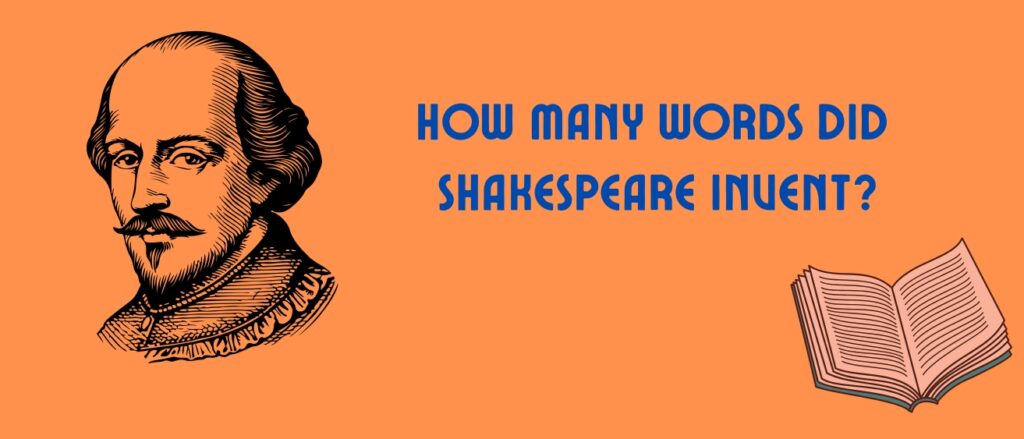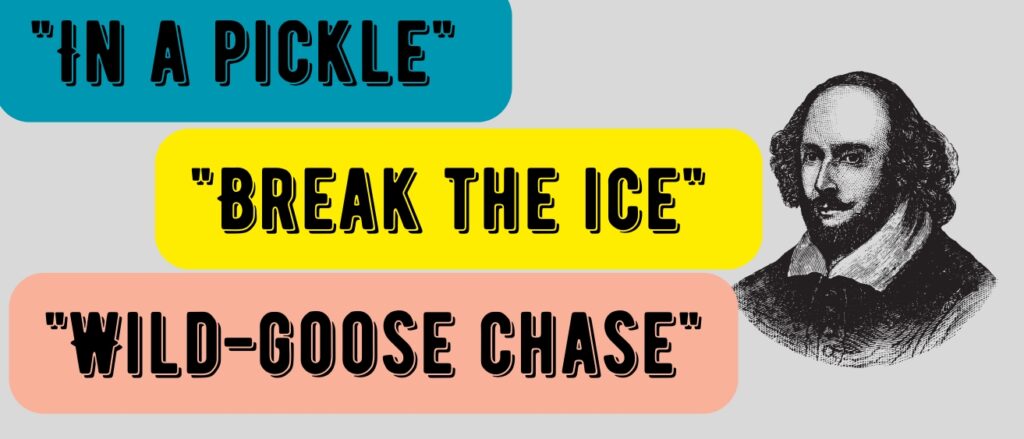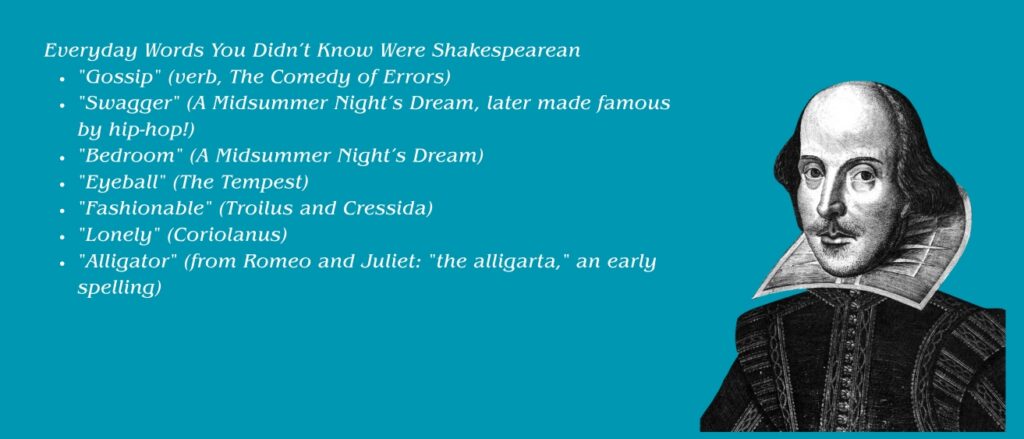William Shakespeare is often credited with inventing or introducing around 1,700 to 2,200 words into the English language. However, this number is debated among scholars.
Key Points About Shakespeare’s Word Inventions:
- Estimates Vary – Some sources claim Shakespeare coined 1,700+ words, while others suggest fewer, as he may have been the first recorded user rather than the true inventor.
- The Oxford English Dictionary (OED) Credits Him – The OED attributes about 1,700-2,200 first usages to Shakespeare, but some were likely already in spoken use.
- Types of Words – Many were:
- Compound words (“eyeball,” “bedroom”)
- Verb conversions (“to elbow,” “to gossip”)
- Prefix/suffix additions (“uncomfortable,” “laughable”)
- Completely new terms (“swagger,” “puking”)
Famous Examples:

- “Assassination” (Macbeth)
- “Dishearten” (Henry V)
- “Fashionable” (Troilus and Cressida)
- “Lonely” (Coriolanus)
Why the Confusion?
- No earlier records – Many words might have been slang or spoken before appearing in his plays.
- Creative adaptations – Shakespeare often repurposed existing words in new ways.
While Shakespeare didn’t necessarily invent all these words, his plays helped popularize them. The most accepted estimate is around 1,700+ words linked to his works.
Here’s a list of surprising, vivid, and widely used words that Shakespeare either invented or popularized in his plays and sonnets:
1. Everyday Words You Didn’t Know Were Shakespearean
- “Gossip” (verb, The Comedy of Errors)
- “Swagger” (A Midsummer Night’s Dream, later made famous by hip-hop!)
- “Bedroom” (A Midsummer Night’s Dream)
- “Eyeball” (The Tempest)
- “Fashionable” (Troilus and Cressida)
- “Lonely” (Coriolanus)
- “Alligator” (from Romeo and Juliet: “the alligarta,” an early spelling)
2. Dramatic & Violent Words
- “Assassination” (Macbeth)
- “Bloodstained” (Titus Andronicus)
- “Dishearten” (Henry V)
- “Puking” (As You Like It – “the infant, mewling and puking in the nurse’s arms”)
3. Playful & Weird Ones
- “Zany” (Love’s Labour’s Lost)
- “Hobnob” (Twelfth Night – originally “hab or nab,” meaning “have or have not”)
- “Skim-milk” (Henry IV, Part 1)
- “Undress” (as a noun, The Taming of the Shrew)
4. Words That Sound Modern (But Aren’t)
- “Manager” (A Midsummer Night’s Dream)
- “Advertising” (as in “paying attention,” Much Ado About Nothing)
- “Critic” (Love’s Labour’s Lost)
- “Eventful” (As You Like It)
5. Surprisingly Dark or Bizarre
- “Bump” (as a verb, Romeo and Juliet)
- “Ladybird” (a term of endearment in Romeo and Juliet, now a bug!)
- “To blanket” (as in covering something, King Lear)
Bonus: Phrases He Coined

Shakespeare also gave us hundreds of idioms still in use today, like:
- “Break the ice” (The Taming of the Shrew)
- “Wild-goose chase” (Romeo and Juliet)
- “In a pickle” (The Tempest)
- “The green-eyed monster” (jealousy, Othello)
Final Fun Fact:

Some words Shakespeare used didn’t stick, like:
- “Barky” (tree-covered, Coriolanus)
- “Congreeted” (mutually greeted, Henry V)
Would you believe we still use hundreds of his words daily without realizing it? His linguistic creativity was (and still is) unmatched!
how many words did shakespeare invent?
William Shakespeare is often credited with inventing around 1,700 words in the English language, though this figure is debated among scholars[ However, many of these words were likely already in colloquial use during the Elizabethan era, and Shakespeare was simply the first to document them in writing.
Key Points:
- First Written Record: The Oxford English Dictionary attributes many words to Shakespeare as their first recorded usage, but this is partly because Victorian scholars cited his works more extensively than others
- Word Formation Methods: Shakespeare creatively adapted existing words by:
- Adding prefixes (e.g., uncomfortable from comfortable).
- Converting nouns to verbs (e.g., to friend).
- Combining words (e.g., lackluster)
Debated Counts: Some researchers argue the actual number of newly coined words is lower, such as 594 non-compound words, excluding adaptations or borrowed terms
- Addiction (Henry V)
- Fashionable (Troilus and Cressida)
- Eyeball (The Tempest)
While Shakespeare’s linguistic creativity is undeniable, the 1,700-word claim often conflates genuine coinages with his role in popularizing or first documenting existing terms
How did Shakespeare’s words influence modern English
William Shakespeare’s linguistic contributions profoundly shaped Modern English through vocabulary expansion, grammatical standardization, and enduring idiomatic expressions. Here’s a breakdown of his influence:
- Coinages: Assassination (Macbeth), bedroom (A Midsummer Night’s Dream), eyeball (The Tempest).
- Adaptations: He transformed nouns into verbs (e.g., to gossip) and added prefixes/suffixes (e.g., undress from dress)
Before Shakespeare, English lacked consistent grammar and spelling. His works, widely circulated and later cited in dictionaries like Samuel Johnson’s, helped standardize:
- Grammar: Innovations in sentence structure and syntax.
- Spelling: His plays contributed to stabilizing spelling conventions
Idiomatic Phrases
Many Shakespearean phrases remain embedded in everyday speech:
- “Break the ice” (The Taming of the Shrew)
- “Heart of gold” (Henry V)
- “Wild-goose chase” (Romeo and Juliet)
Literary and Poetic Techniques
- Blank Verse: He perfected iambic pentameter, influencing poets like Tennyson and Dickens.
- Neologisms: His creative wordplay set precedents for literary innovation
Debates and Nuances
While often credited with “inventing” words, scholars note many were likely in colloquial use; his role was documenting and popularizing them
Shakespeare’s legacy lies not just in individual words but in shaping English’s expressive potential, making his language a cornerstone of modern communication
What are some phrases coined by Shakespeare that are still commonly used today?
Here are some commonly used phrases coined by Shakespeare, still prevalent in modern English:
Everyday Idioms
- “Break the ice” (The Taming of the Shrew) – To ease social tension.
- “Wild-goose chase” (Romeo and Juliet) – A futile pursuit.
- “Green-eyed monster” (Othello) – Jealousy.
- “Heart of gold” (Henry V) – A kind and generous person.
- “All that glitters is not gold” (The Merchant of Venice) – Appearances can deceive.
Descriptive Expressions
- “In a pickle” (The Tempest) – In a difficult situation.
- “Wear one’s heart on one’s sleeve” (Othello) – To openly show emotions.
- “The world’s my oyster” (The Merry Wives of Windsor) – Unlimited opportunities.
- “Foregone conclusion” (Othello) – An inevitable outcome.
Literary Contributions
- “Star-crossed lovers” (Romeo and Juliet) – Doomed romance.
- “Brave new world” (The Tempest) – Ironic reference to a hopeful future.
- “Melted into thin air” (The Tempest) – To disappear suddenly.
Shakespeare’s phrases endure because they encapsulate universal human experiences with striking clarity. Many were likely colloquialisms he immortalized, cementing their place in the language
Are there any phrases from Shakespeare that have different meanings today ?
Yes, many phrases coined by Shakespeare have evolved or shifted in meaning over time. Here are notable examples:
Phrases with Altered Meanings
- “The world is my oyster” (The Merry Wives of Windsor)
- Then: A boast about limitless opportunities.
- Now: Often used ironically or to imply entitlement.
- “Brave new world” (The Tempest)
- Then: Miranda’s naive awe at humanity.
- Now: Sarcastic critique of dystopian progress (popularized by Huxley’s novel).
- “Cruel to be kind” (Hamlet)
- Then: Justifying harsh actions for moral correction.
- Now: Broadly applied to tough-love scenarios, even trivial ones.
- “Wild-goose chase” (Romeo and Juliet)
- Then: A chaotic horse race where riders followed a leader in formation.
- Now: Any futile pursuit.
- “What a piece of work is man” (Hamlet)
- Then: Sarcastic lament on human frailty.
- Now: Often a genuine praise of human achievement.
Idioms with Nuanced Shifts
- “Green-eyed monster” (Othello)
- Then: Literal association of jealousy with green (linked to illness).
- Now: Symbolic envy, detached from color symbolism.
- “Murder most foul” (Hamlet)
- Then: Specifically regicide (killing a king).
- Now: Any heinous murder.
- “Dog will have his day” (Hamlet)
- Then: Underdogs’ eventual triumph.
- Now: Generalized to mean anyone’s moment of success.
Words vs. Phrases
Some words Shakespeare used also shifted meanings (e.g., “an” meant “if”, “still” meant “always”), but the phrases above show how cultural usage reshaped their original contexts.
Shakespeare’s language remains dynamic, with modern reinterpretations often overshadowing Elizabethan intent.
Are there any modern authors who have similarly contributed to the English language ?
Several modern authors have significantly enriched the English language through inventive vocabulary, cultural idioms, and narrative innovations. Here are key contributors:
Lexical Innovators
- J.K. Rowling (Harry Potter series):
- Coined terms like Muggle (non-magical person), Quidditch (wizarding sport), and Horcrux (dark magical object), now embedded in global vernacular
- George Orwell (1984, Animal Farm):
- Introduced Big Brother, thoughtcrime, and doublethink—terms now central to discussions of surveillance and propaganda
- Dr. Seuss (Theodor Geisel):
- Playful neologisms (Grinch, nerd) entered mainstream English, especially in children’s literature.
Cultural Idioms & Phrases
- Douglas Adams (The Hitchhiker’s Guide to the Galaxy):
- Popularized “Don’t panic” and “42” as shorthand for existential absurdity.
- Terry Pratchett (Discworld series):
- Phrases like “The turtle moves” (challenging dogma) and “Vimes’ boots theory” (class inequality) gained colloquial traction.
Stylistic & Narrative Influence
- Toni Morrison (Beloved, Song of Solomon):
- Reimagined African American vernacular, blending folklore with modernist prose to expand literary English.
- Cormac McCarthy (The Road, Blood Meridian):
- His sparse, punctuation-defying style reshaped contemporary narrative conventions.
Global Contributions
- Salman Rushdie (Midnight’s Children):
- Hybridized English with Indian idioms (e.g., “chutnification”), reflecting postcolonial linguistic fusion
- Chimamanda Ngozi Adichie (Half of a Yellow Sun):
- Integrated Igbo phrases and structures into English, broadening its diasporic expression.
While none match Shakespeare’s scale, these authors demonstrate how modern literature continues to evolve English through creativity and cultural reflection.



